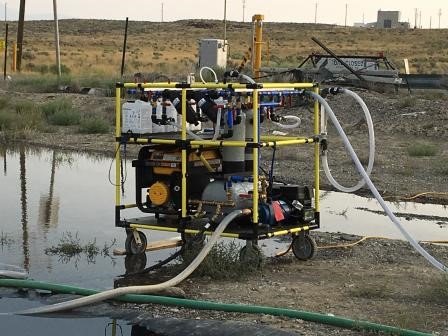Building Resiliency: Emergency Water Treatment System
About the Webinar
Originally presented March 18, 2021

Boil advisories and water contamination issues have become an all too common impact of natural disasters, as seen most recently with the Texas winter storm and 2020 hurricane season. Following an emergency event, communities need access to clean water not only for drinking but also for cooking, cleaning, and medical triage. Most emergency water treatment systems are large and expensive tractor-trailer mounted systems. They can be complicated to operate, requiring specialized knowledge, and may not be able to access hard-to-reach areas devastated by disasters. A common solution for communities struggling with access to clean water during an emergency event is to provide bottled water. However, long-term dependence on bottled water creates a large solid waste disposal problem and only exacerbates debris management following a disaster.
EPA researchers partnered with WaterStep, a nonprofit whose mission is to provide safe water and sanitation to communities, to develop a modular, mobile water treatment system known as Water on Wheels – Emergency Mobile Water Treatment System (also known as the WOW Cart). This partnership was developed through the Federal Technology Transfer Act cooperative research and development agreement (CRADA), which allows the federal government to work directly with private companies. The WOW Cart is an inexpensive and versatile water treatment system about the size of a shopping cart. It is configured with multiple treatment technologies and is equipped with alternative power sources. The system is easy to operate and can be deployed to critical infrastructure ahead of oncoming natural events, such as hospitals, to build resiliency. This presentation will discuss the development of the WOW Cart and how it has been applied in disaster areas, such as 2020 Hurricane Laura in Louisiana and 2017 Hurricane Maria in Puerto Rico.
About the Presenters
Jim Goodrich, Ph.D. is a Senior Science Advisor with EPA’s Office of Research & Development. He has a Ph.D. and B.S. from the University of Cincinnati and an M.S. from Florida State University. During his career, he has managed large multidisciplinary programs relative to water infrastructure protection, small community drinking water and wastewater needs, watershed protection and restoration, source water spill modeling, and international drinking water treatment technology demonstrations. He is currently responsible for full-scale evaluations of water infrastructure decontamination, innovative emergency water treatment technology, and emergency stormwater response mitigation tools.
Kurtis Daniels is the VP and Director of Training and Field Operation at WaterStep. He has spent more than 25 years in the plumbing and pipe fitting industry. He came onboard at WaterStep late in 2001 as a volunteer and full time in 2006. With his background in plumbing and sanitation, combined with his ability to teach people the skills they need to save lives with safe water, WaterStep has been able to educate and empower millions of people around the world. Kurtis is the lead designer of what today is known as the Water On Wheels Cart, where he has taken all of WaterStep’s simple technologies and put them all together in one manageable place.
Mark Hogg is a motivational speaker and the Founder and CEO of WaterStep, a non-profit organization that works to save lives around the world with safe water. Since its humble beginnings in 1995 as a small mission-based group with one employee, Mark has led the organization through transitions and growth resulting in WaterStep becoming a major player in the international fight against waterborne disease. Under Mark’s leadership, WaterStep has designed and built groundbreaking tools, training, networks and technologies that have advanced the fight against waterborne disease and improved the lives of 4 million in 55 countries around the world.
